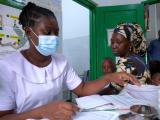Mar 12, 2009
WHO asks Egypt to probe H5N1 cases in children
The World Health Organization (WHO) is asking Egypt's health ministry to investigate why so many young children are becoming infected with the H5N1 avian influenza virus, according to a report today from the Integrated Regional Information Networks (IRIN), part of the United Nations Office for the Coordination of Human Affairs. Of seven H5N1 case-patients that Egypt has reported this year, all have been children younger than 3 years. All reportedly had contact with sick or dead poultry. John Jabbour, a senior WHO epidemiologist, said the cases might reflect decreased vigilance and warned that families must remain alert, because the virus is endemic in Egyptian poultry.
[Mar 12 IRIN story]
New meningitis vaccine said to offer eradication hope for Africa
To begin eradicating meningitis from Africa, the WHO will launch a mass vaccination campaign later this year in Burkina Faso using 25 million doses of a new vaccine that for the first time will offer long-term protection from the disease, according to an IRIN report published today. The WHO said it hopes to immunize 250 million people in Africa's "malaria belt" by 2015. The Bill and Melinda Gates Foundation supported development of the new vaccine.
[Mar 12 IRIN story]
Rare simian malaria sickens US woman
For the first time in decades, an American has been diagnosed with a rare simian malaria infection, according to a report in tomorrow's issue of Morbidity and Mortality Weekly Report (MMWR). Four Plasmodium species cause most malaria infections, but a fifth—Plasmodium knowlesi—is emerging as an important zoonotic threat, and, unlike other forms of simian malaria, it can cause a life-threatening disease. The 50-year-old woman from New York had traveled to a remote part of the Philippines to visit family and got sick after returning to the United States. She recovered after treatment with atovaquone-proguanil and primaquine.
[Mar 13 MMWR report]
Genotype study tracks TB cluster
Tuberculosis (TB) genotyping can help detect outbreaks early and help identify relationships between patients, especially when investigators have difficulty identifying patient contacts, researchers report in tomorrow's issue of MMWR. They used the technique to investigate a cluster of eight TB cases in the Detroit area between December 2004 and April 2007. They found that six of the patients were probably involved in the same chain of transmission.
[Mar 13 MMWR report]
Well water tests negative for E coli outbreak strain
Water from private wells near the site of a Locust Grove, Okla., Escherichia coli outbreak last August contained three different strains of the pathogen (O141, O179, and O113), but not the rare O111 strain that sickened about 300 people and killed one man, the Associated Press (AP) reported today. The tests were conducted by the Centers for Disease Control and Prevention.
Obama seeks better coordination of food safety efforts
In the wake of the Salmonella outbreak tied to peanut products, President Barack Obama said yesterday he has ordered the nation's food safety agencies to coordination their efforts better and to find ways to detect contaminated food more quickly, the Atlanta Journal-Constitution (AJC) reported yesterday. He said he has ordered the departments of Agriculture and Health and Human Services to come up with a plan for better integration of their food safety efforts. Obama made the remarks in a White House interview with the AJC and other newspapers.
Call for mandatory farm-animal identification system stirs debate
The idea of requiring all livestock owners to participate in the US National Animal Identification System (NAIS) drew support and opposition from different farm groups at a congressional hearing yesterday. The voluntary program was set up in 2004 to track farm animals for disease-control purposes, but many want to make the program mandatory, noted a report by Farm Futures. At a House Agriculture subcommittee hearing, officials of the National Pork Producers' Council and the National Dairy Producer Federation testified in favor of mandatory participation, the report said. But the National Cattlemen's Beef Association and R-CALF USA (the Ranchers-Cattlemen Action Legal Fund) opposed it.
WHO urges focus on health effects of climate change
Policy-makers should pay attention to the health effects of climate change as they set priorities for steps to mitigate it, the WHO said yesterday. Health hazards related to climate change include an increased risk of extreme weather, changes in infectious disease dynamics, and rising sea levels, the agency said. The WHO estimates that about 150,000 deaths per year in low-income countries can be traced to climate change. Immediate causes include crop failures, diarrheal diseases, malaria, and flooding. The WHO made the statement in conjunction with a climate change conference in Copenhagen.
[Mar 11 WHO statement]


















